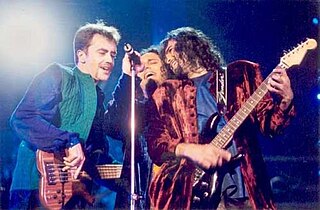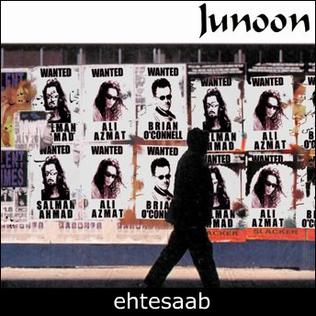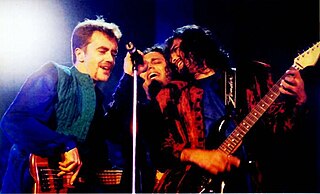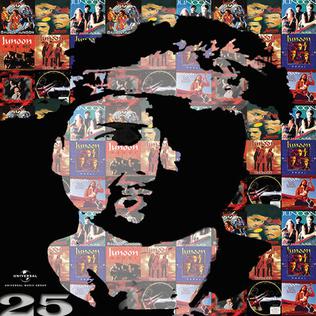
Junoon is a Pakistani sufi rock band from Lahore, Punjab, Pakistan, and Tappan, New York, formed in 1990.

Salman Ahmad is a Pakistani born-American musician, rock guitarist, physician, activist, occasional actor and professor at the City University of New York.

Junoon is the debut album of the Pakistani sufi rock band Junoon, released on 30 September 1992. It was released by EMI and recorded at the EMI studios in Karachi in 1990. The album is produced by founder, songwriter and lead guitarist Salman Ahmad. The album contained a total track list of twelve songs with eight tracks being in Urdu language, three tracks in English and one instrumental.

Millennium 1990–2000 is the second compilation album and the seventh overall album released by Pakistani rock band, Junoon. It was released in 2000. The album features some best songs of band. It also includes two live versions of "Allah Hu", "Lal Meri Pat". It includes emotive song "Azadi" from the movie based on the life of Quaid-e-Azam Mohammad Ali Jinnah, the founder of Pakistan. The song is a tribute to Jinnah and his work towards the creation of Pakistan. "Azadi" is followed by Neend Ati Nhin one of Junoon's early hits. It also features sufi songs such as Ghoom which has an emotive guitar solo and emotive vocals. It has Junoon's patriotic song Jazba-e-Junoon which was released as single for the 1996 Cricket World Cup. Released in 2000 album was received well in Pakistan.

Junoon for Peace is the first live album and the eleventh overall album by the Pakistani band, Junoon. The album was recorded live on October 27, 2001.

Junoon is a Pakistani sufi rock band founded in 1990 by lead guitarist and only original member, Salman Ahmad. The band has released seven studio albums, as well as numerous live albums, compilations, singles, video albums, music videos, and soundtracks. Keyboardist Nusrat Hussain left the band after the first studio album release and was replaced by bassist Brian O'Connell. They released their self-titled debut album in 1991; which barely made a dent in the Pakistani music industry. Guitarist Mekaal Hasan and band producer John Alec replaced O'Connell, and have been playing bass for live shows since O'Connell's departure.
"Jazba-e-Junoon" is a song by the Pakistani sufi rock band Junoon. It is the thirteenth and final track from the band's album third album, Inquilaab (1996), released on EMI Records. Written by Sabir Zafar and guitarist Salman Ahmad and it is the lead single on the album, the song uses blending of rock guitars and bluesy vocals with eastern elements like the use of tablas, raga-inspired melodies and traditional Pakistani folk music.
"Ghoom Taana" is a song by Pakistani sufi rock band Junoon. It was released as the fifth and final single from their seventh full-length studio album, Dewaar. The single also featured in Salman Ahmad's debut solo album, Infiniti. The song was originally sung jointly by Ali Noor, vocalist of Noori, and Ali Azmat. However, the duet sung with Shubha Mudgal featured only Salman Ahmad for the male vocals. In 2016, a new rendition of the song featured in the band's eighth studio album, Door.

Rock & Roll Jihad is the first soundtrack album and the eighteenth overall album of the Pakistani band, Junoon. The soundtrack is based on Salman Ahmad and Junoon's musical journey. The album features five new studio recordings along with five live tracks from "The concert for Pakistan" and the album was officially released on 1 June 2010 under the record label Nameless Sufi Music on all major online stores. Salman Ahmad, lead guitarist & vocalist, also published a book named, Rock & Roll Jihad: A Muslim Rock Star's Revolution, regarding his time with Junoon and all the struggle he faced to become a rockstar.

"Ehtesaab" is the second track on the 1995 compilation album Kashmakash by the sufi rock band Junoon, and is the second single from the album. After the release of the band's first real big hit single "Jazba-e-Junoon", which was the song of the 1996 Cricket World Cup. "Ehtesaab" was their second hit and was released in December 1996. The video of the single was directed by Pakistani director, Shoaib Mansoor.
Inquilaab – The Story of Junoon is a 44-minute radio broadcast documentary presented by Omar Bilal Akhtar, broadcast on City FM 89, on March 13, 2009. The documentary explores the journey of the South Asian rock music band Junoon and the struggle they face to become one of the biggest band in the world.

Brian O'Connell is an American multi-instrumentalist, composer, arranger, record producer and actor. He is the bassist and producer for Pakistani sufi rock band Junoon.
Heer" is an instrumental song by the Pakistani sufi rock band Junoon. The instrumental was first released on the band's self-titled debut album, Junoon released in 1991 and later in the fourth studio album, Azadi released in 1997. The instrumental is composed by the band's lead guitarist Salman Ahmad. The instrumental uses blending of rock guitars and bluesy vocals with eastern elements like the use of tablas, raga-inspired melodies and traditional Pakistani folk music.
"Saeein" is a song by Pakistani sufi rock band Junoon. It is Junoon's eleventh single and the second from the 1996 studio album Inquilaab. The song is written by lead guitarist, Salman Ahmad and lyricist, Sabir Zafar. Due to the song's popularity, it also featured on the band's fourth studio album Azadi released in 1997. "Saeein" is one of Junoon's most popular songs, and has been covered numerous times, most notably by Indian singer Harshdeep Kaur. The song marked Junoon's foray into what later became the sufi rock sound that the band is most popularly associated with. The song uses blending rock guitars and bluesy vocals with eastern elements like the use of tablas, raga-inspired melodies, traditional Pakistani folk music, and Eastern inspired poetry.
Sayonee is a song by the Pakistani sufi rock band Junoon, released in April, 1997. It is the first track from the band's fourth album, Azadi (1997), released on EMI Records. Written by lead guitarist and founder of the band Salman Ahmad and writer Sabir Zafar, it is the lead single on the album, the song uses blends of rock guitars and bluesy vocals with traditional musical elements like the tabla percussion drums, Hindustani raga-inspired melodies styled and blended into Pakistani folk music.
"Bulleya" is a song by the Pakistani sufi rock band Junoon, released in 1999. It is the first track from the band's fifth album, Parvaaz (1999), recorded at Abbey Road Studios, London and released on EMI Records. The song is a famous kafi written by the sufi saint Bulleh Shah. Bulleh Shah is famous for his spiritual and metaphysical poetry, and Bullah Ki Jaana is one of his well-known poems. The song is composed and produced by lead guitarist and founder of the band Salman Ahmad. It is the lead single on the album, the song uses blending of rock guitars and bluesy vocals with eastern elements like the use of tablas, raga-inspired melodies and traditional Pakistani folk music.

Talaash is the second studio album of the Pakistani sufi rock band Junoon, released on September 3, 1993. The album was to be their first with bassist Brian O'Connell, who joined the band after Nusrat Hussain departed from the band to pursue his career as a solo artist and released his debut album Amrit in 1992. This was also the first Junoon album produced by Salman Ahmad and O'Connell, both also went on releasing several other albums by Junoon before O'Connell left the band after Dewaar in 2003. The album also served as a soundtrack for the Pakistani television show Talaash, which featured the band and its novel storyline was based on the band.

Door is the ninth studio album and twentieth overall album by the Pakistani rock band Junoon. It was released on 26 December 2016 by Universal Music in Pakistan and India. It is the second Junoon album led by guitarist and singer Salman Ahmad following Ali Azmat's departure in 2005 and a tribute album following the death of former Vital Signs vocalist Junaid Jamshed in plane crash on 07th December 2016, to whom "Khwab" and "Door Bohat Door" are dedicated.











